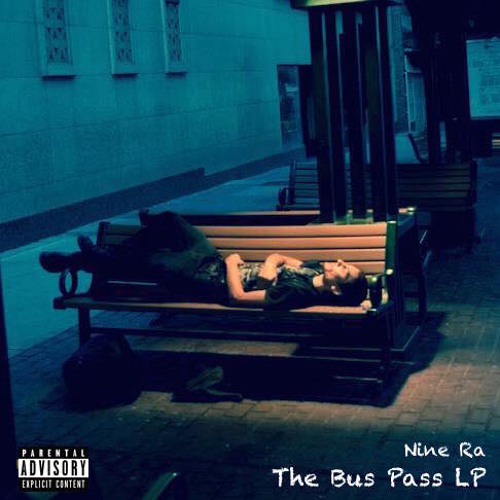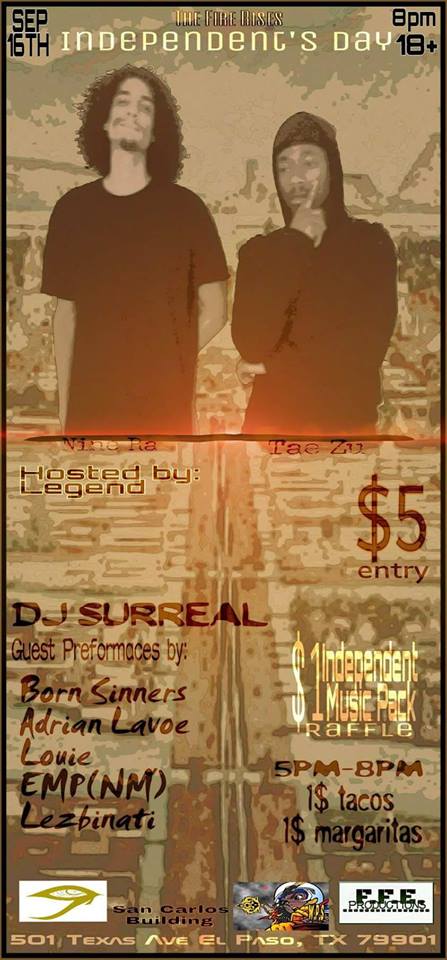
Hip hop artist Jesse Garcia recently dropped his seven-song EP “Bus Pass.” He goes by the name Nine Ra and he and fellow rapper, Tae Zu, have organized the show “The FIRE Rises: Independent’s Day,” in an effort to promote the spirit of locally produced, independently created music. The show takes place this Friday, September 16 at the San Carlos Building.
Fusion caught up with the artist to discuss his start in hip hop, his marketing strategies, and the El Paso music scene.
I know you’re from Virginia. How’d you end up in El Paso?
(Laughs) I named my album “The Bus Pass” because I wanted to encapsulate the journey. The album is written from the perspective of me when I was still in Virginia, kind of like Kendrick Lamar’s first album is supposed to be him, but from a 17-year-old perspective. I’m actually planning my follow up to be about when I’m here. I ended up here because my cousin lives in New Mexico and when I was in Virginia I kind of felt like my life was not advancing, so I wanted to try something new. I took a three day Greyhound bus ride to my cousin’s house, and I stayed with my cousin from June 25 to August 5, 2014. On the fifth I enrolled in [David L. Carrasco] Job Corps. When I graduated I got an apartment and stayed here because I liked the city so much
So, the songwriting process. Is it a profound, “Aha!” moment, or more of “I guess I have to write today” situation?
Basically, first it’s pretty simple—just deciding what I want to write about. I usually get an idea for a song concept. Some days, when I’m not even doing music or anything, I’ll have a song concept. Then I hear a beat and think ‘This would be good for that;’ So I work around that. With my free form songs. . .what I do actually is I freestyle a lot, because when I was in Virginia that was basically one of the main sources of entertainment. In Virginia everybody raps.
In your songs are you always speaking from your perspective, or a character’s?
I’ve thought of that before, and I know there are some rappers who do it. Some of my favorite rappers, like Naz, will talk from the perspective of a gun and stuff like that. So far I’ve only told autobiographical stuff.
What rappers are you into?
I like 90s hip hop a lot. Naz is one of my favorite rappers, and for a very specific reason. My goal is to become the best rapper in all different aspects. I feel like certain rappers have certain strengths and vulnerabilities. For example a rapper like Tupac or DMX and say “These rappers don’t have punch lines; they’re not battle rappers, they’re not particularly clever.’ But their vocal delivery, the passion they have in their voice is good. So there are different skills, and I want to have every single skill. I feel like Naz has every single skill. He’s my favorite rapper because that’s my goal.
How long have you been doing this?
I was rapping secretly since I was 15. When I started publicly rapping I was in 11th grade. When I recorded my first real mixtape in the studio I was 17. I consider that to be when I started because it was no longer just to pass the time; it was like ‘I’m going to leave something tangible as a testament.’ When I made that mixtape, it’s called “Global Judas”, I felt like I was not going to live very much longer. So I felt like if I could leave a physical testament to my existence before I died, that was going to be it.
Why did you feel like you weren’t going to live very long?
Just circumstances. I’ve been around a lot of violence; that’s why I talk about it in my music. I just didn’t feel real good about myself either. I was dealing with a lot of problems. On that first mixtape I talk about killing myself, which I guess is not super common. The only rapper I can think of who talks about that is Biggie Smalls. At that point of my life I didn’t care about myself. I was creating situations that were destructive, violent, and negative. I was taking drugs and selling drugs. It was not a good time.
How’d you get out of that situation?
(Laughs) By coming here. And I started to wake up a little bit by becoming more mature.
Did you have anyone help you out?
A particular girl . . she was living on her own. Part of the reason it didn’t work out was because I wasn’t doing shit with my life. I realized like not so much ‘Oh I’m going to try to get her back’ or anything; she just kind of made me open my eyes to myself and to look in the mirror and be like “Dude you got to get your shit together.” I stopped selling drugs. I stopped taking drugs. I recognized the problems and I was trying to get away from people. I moved to another side of town, but I would still see my old friends. So it wasn’t enough. I went to New Mexico when I was 20. I was in a place that was in the middle of nowhere.
Fast forward to being in El Paso.
I just recently got my first car, like in my whole life, last year at the end of the year. I got my first car ever at 22 years old. Some kids get their first car at like 16, 18.
That’s exciting. That’s a lot of freedom!
That’s another reason I wanted to call my LP “Bus Pass.” I remember I always used to use that as an excuse: “I don’t have transportation, so I can’t do shows; if I can’t do shows, there’s no point in being a rapper.” I came out with my first Mixtape when I was 17, then I didn’t come out with another Mixtape until 2015, when I was 22. So there’s a big gap and I used all kinds of excuses. Like “I don’t have money to record,” or “I don’t have transportation to go do shows,” or “It’s too expensive to buy equipment.” Just stupid shit. Once I got my car I was able to take hip hop more seriously.
Talk a little about your work ethic.
It’s funny now because I’m nothing like I was when I was 18, 19. If you see my work ethic now . . . I actually have a lot of people tell me that I inspired them. They’ll tell me “It makes me more motivated when I see you making moves.” It’s crazy to think that now I’m at that level.
So what’s the formula you use to promote yourself?
There are two main strategies for promoting your music: Groundwork and online. Groundwork is when you’re right in front of people. I go up to random people on the street and I say “My name is Jesse Garcia and I represent a local label here. We’re trying to get some exposure. Would you like to listen to some music?” So I’ll either hand them headphones or I’ll just rap right there. You have to have a good balance of groundwork and social media presence.
That’s crazy because twice this summer I was in the northeast at the same store and these dudes handed me their cards and told me to check out their music. I’d never seen that before.
I love it! It’s a very hip hop thing. Here’s the thing if I was some white kid with an acoustic guitar, I could sit out in front of that store with a hat and people would give me money. But with hip hop it’s a lot different because the average person doesn’t want to hear hip hop. So you really have to hustle and that’s something you’d see in Virgina or even in Houston.
It seems hard to be a hip hop artist here.
It is. You get a lot of people who are like me when I was in my immature stage, who are making a lot of excuses why they’re not making music. Or saying stuff like, and this is my favorite one: “You should drop a guest verse on my song,” and it NEVER happens! Either they don’t hit me up, they don’t have a studio or the means to go to a studio, or they’re not serious about it themselves. That’s why I like Tae Zu a lot. He showed me it was possible to go up to people and sell music. The first time I ever saw someone go up to a random person and talk about their music was at the swap meet when he did it. That was the spark in my head that I could do the same thing. So far I’ve made $100.
Is it hard to hook up with shows too?
Well I’m my own boss—I don’t have a manager or a promoter. I make moves on my own. I started out just doing open mic gigs. When you do that a good idea is to make connections and also to direct as many people as you possibly can to your social media [sites]. I used to just pass out by business card, but I realized that wasn’t really that effective. Now I’m going to try to start actually making mother**kers take out their phones and make them go to these pages. But that’s a secondary mission. My primary mission is to talk to the venue owners. That’s how I got this show coming up.
So what’s the mood like out there in terms of venue owners and the crowds?
The crowds are changing. When I was doing open mics, people were polite and like ‘He’s pretty good, but it’s not my thing.’ The crowd composition is different at those shows too. Most of the people who go to open mics are performers themselves, or the friends of the performers. Now as I’ve moved into doing paid shows and at different locations, I’ve gotten better responses and.
Has it been a learning curve?
Definitely. I’ve learned not to be too loud. It’s almost like pacing yourself when you run. Another thing I learned is don’t perform emotional songs. I’d perform some of the more autobiographical tracks—that’s not a good idea, because people go to shows to forget about their problems.
How do you keep yourself motivated when you see the crowd’s not that into it?
I try to move more. You’ll see rappers who are shitty, but if you watch them on stage, they turn up and it’s really hype. The thing is back in the days it was like “We’re men; we don’t dance; we’re just going to sit on the wall and pretend we’re cool.” Now, rappers move around more. That’s what I do and I take advantage of the fact I’m tall . . I’m 6’1’’. I’m lanky and I have long arms and when I perform I try to move as much as possible, and make myself seem as big as possible, especially when the crowd’s not reacting.
So you see a difference when you get hyped up?
I see a BIG difference.
Is stage presence on an equal footing with technique?
Oh definitely. That’s why I put so much emphasis on freestyling. That’s how you prove you’re a rapper.
What venues have you performed at?
The Black Orchid, the Rock House gallery, 306 Studios, Creative Minds Studio on the east side, and the Grind Bar, but it’s closed now.
The FIRE Rises: Independent’s Day is Friday, September 16
San Carlos Building 501 Texas Ave
https://soundcloud.com/nixnera


